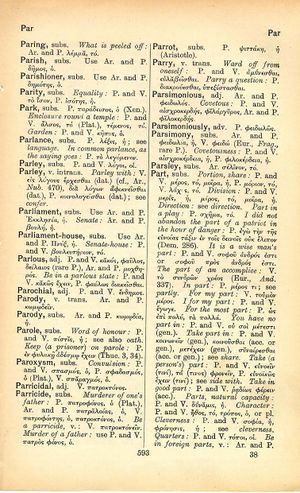parsimony: Difference between revisions
From LSJ
Δυσαμένη δὲ κάρηνα βαθυκνήμιδος ἐρίπνης / Δελφικὸν ἄντρον ἔναιε φόβῳ λυσσώδεος Ἰνοῦς (Nonnus, Dionysiaca 9.273f.) → Having descended from the top of a deep-greaved cliff, she dwelt in a cave in Delphi, because of her fear of raving/raging Ino.
m (Text replacement - "<b class="b2">Frag.</b>" to "''Frag.''") |
m (Woodhouse1 replacement) |
||
| Line 1: | Line 1: | ||
{{Woodhouse1 | {{Woodhouse1 | ||
|Text=[[File:woodhouse_593.jpg|thumb|link={{filepath:woodhouse_593.jpg}}]] | |Text=[[File:woodhouse_593.jpg|thumb|link={{filepath:woodhouse_593.jpg}}]] | ||
Ar. and P. [[φειδωλία]], ἡ, V. [[φειδώ]] (Eur., '' | ===substantive=== | ||
[[Aristophanes|Ar.]] and [[prose|P.]] [[φειδωλία]], ἡ, [[verse|V.]] [[φειδώ]] ([[Euripides|Eur.]], ''Fragment'', rare [[prose|P.]]). | |||
[[covetousness]]: [[prose|P.]] and [[verse|V.]] [[αἰσχροκέρδεια]], ἡ, [[prose|P.]] [[φιλοκέρδεια]], ἡ. | |||
}} | }} | ||
Revision as of 08:58, 20 May 2020
English > Greek (Woodhouse)
substantive
Ar. and P. φειδωλία, ἡ, V. φειδώ (Eur., Fragment, rare P.).
covetousness: P. and V. αἰσχροκέρδεια, ἡ, P. φιλοκέρδεια, ἡ.

